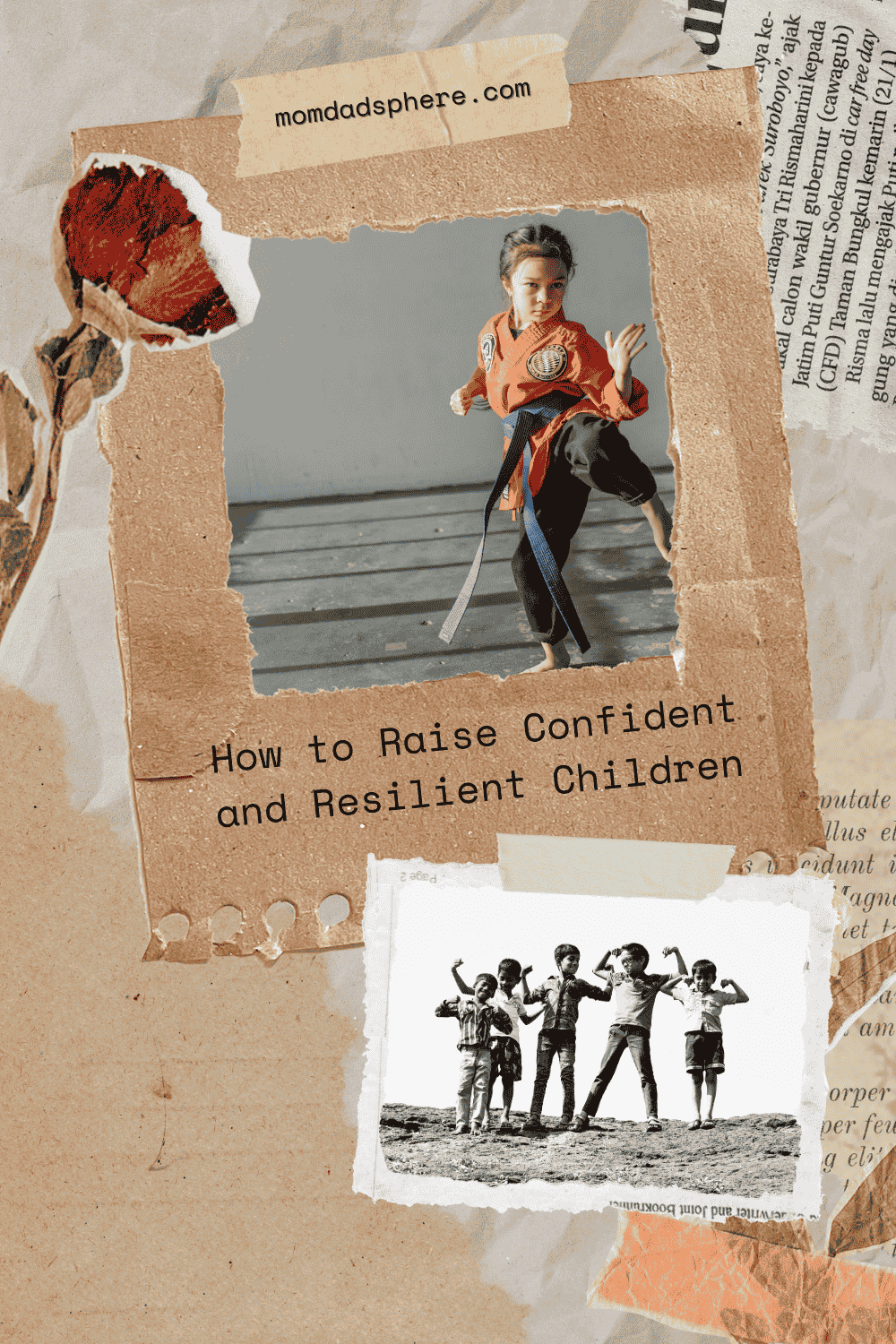Raising confident and resilient children is one of the most rewarding yet challenging tasks for parents. In a world that is constantly changing and presenting new challenges, equipping children with the tools to navigate life with confidence and resilience is essential. This article will explore practical strategies and insights to help you foster these qualities in your children, ensuring they grow into strong, capable, and emotionally intelligent individuals.
10 Ways to Raise Confident, Resilient Kids
Raising confident and resilient children is a journey that requires patience, love, and intentional strategies. In this article, we’ll explore 10 practical methods to help your child develop the confidence to face challenges and the resilience to bounce back from setbacks. From fostering emotional connections to encouraging healthy risk-taking, these tips will empower you to nurture strong, capable, and emotionally intelligent children. Let’s dive in! 🚀👨👩👧👦
🌈 1. Build a Strong Emotional Connection
🤗 The Power of Unconditional Love
Children who feel loved and accepted for who they are, regardless of their achievements, are more likely to develop confidence and resilience. Show your child that your love is unconditional—celebrate their successes, but also reassure them that mistakes and failures do not diminish their worth.
🗣️ Open Communication
Encourage open and honest communication. Create a safe space where your child feels comfortable expressing their thoughts, feelings, and concerns. Listen actively without judgment, and validate their emotions. This helps them develop emotional intelligence and the ability to articulate their needs.
🎭 Model Emotional Regulation
Children learn by observing their parents. Demonstrate how to handle stress, frustration, and disappointment in healthy ways. Show them that it’s okay to feel emotions but also teach them how to manage and express those emotions constructively.
🌟 2. Encourage Independence and Problem-Solving
🛠️ Let Them Take Risks
While it’s natural to want to protect your child from harm, allowing them to take age-appropriate risks is crucial for building confidence. Whether it’s climbing a tree, trying a new sport, or solving a difficult puzzle, these experiences teach children that they are capable of overcoming challenges.
� Teach Problem-Solving Skills
Instead of immediately stepping in to solve your child’s problems, guide them through the process of finding solutions. Ask open-ended questions like, “What do you think you can do about this?” or “How do you think we can fix this?” This encourages critical thinking and self-reliance.
🏆 Celebrate Effort, Not Just Success
Praise your child’s effort and perseverance rather than just the outcome. This helps them understand that hard work and determination are valuable, even if they don’t always lead to success. It also reduces the fear of failure, which can hinder confidence and resilience.
🌿 3. Foster a Growth Mindset
🌱 Embrace Mistakes as Learning Opportunities
Teach your child that mistakes are a natural part of learning and growth. Share stories of your own failures and what you learned from them. This helps normalize setbacks and reinforces the idea that they are opportunities for improvement.
📚 Encourage a Love for Learning
Instill a love for learning by making it a fun and engaging experience. Encourage curiosity and exploration, and provide opportunities for your child to discover new interests. A growth mindset thrives on the belief that abilities can be developed through dedication and hard work.
🌟 Set Realistic Expectations
While it’s important to encourage your child to aim high, it’s equally important to set realistic expectations. Unrealistic goals can lead to frustration and a sense of inadequacy. Help your child set achievable goals and celebrate their progress along the way.
🌞 4. Teach Coping Skills and Stress Management
🧘 Introduce Mindfulness and Relaxation Techniques
Teach your child simple mindfulness and relaxation techniques, such as deep breathing, meditation, or yoga. These practices can help them manage stress and anxiety, and develop a sense of inner calm.
🏃 Encourage Physical Activity
Regular physical activity is not only good for the body but also for the mind. Exercise releases endorphins, which can boost mood and reduce stress. Encourage your child to participate in sports, dance, or any physical activity they enjoy.
� Create a Balanced Routine
A balanced routine that includes time for school, play, rest, and family activities can help reduce stress and create a sense of stability. Ensure your child has enough downtime to relax and recharge.
🌍 5. Expose Them to Diverse Experiences
🌐 Encourage Exploration of Different Cultures and Perspectives
Expose your child to different cultures, traditions, and perspectives. This broadens their understanding of the world and helps them develop empathy and adaptability. Travel, read books, or participate in cultural events together.
🎨 Support Creative Expression
Encourage your child to explore their creativity through art, music, writing, or other forms of expression. Creative activities allow children to express themselves, build confidence, and develop problem-solving skills.
🤝 Promote Social Connections
Help your child build strong social connections by encouraging friendships and group activities. Positive social interactions can boost self-esteem and provide a support network during challenging times.
🌟 6. Be a Role Model of Confidence and Resilience
🦸 Demonstrate Confidence in Your Own Abilities
Children often mirror the behavior of their parents. Show confidence in your own abilities and decisions, even when faced with challenges. This sets a powerful example for your child to follow.
🛤️ Share Stories of Overcoming Adversity
Share stories of times when you faced adversity and how you overcame it. This not only provides a real-life example of resilience but also shows your child that challenges are a normal part of life.
🌈 Maintain a Positive Outlook
Maintain a positive outlook, even in difficult situations. This doesn’t mean ignoring problems, but rather approaching them with a solution-focused mindset. Your attitude can greatly influence your child’s perspective on life.
🌟 7. Encourage Healthy Risk-Taking
🎢 Support Trying New Things
Encourage your child to try new activities and step out of their comfort zone. Whether it’s joining a new club, trying out for a team, or learning a new skill, these experiences help build confidence and resilience.
🛡️ Teach Them to Assess Risks
Help your child learn how to assess risks and make informed decisions. Discuss potential outcomes and consequences, and guide them in weighing the pros and cons. This skill is crucial for making safe and confident choices.
🏅 Celebrate Courage
Acknowledge and celebrate your child’s courage when they take on new challenges. This reinforces the value of bravery and perseverance, even when the outcome is uncertain.
🌟 8. Provide Opportunities for Leadership
Encourage Responsibility
Give your child opportunities to take on responsibilities, such as leading a project, organizing an event, or helping with household chores. These experiences build leadership skills and a sense of accomplishment.
🗳️ Involve Them in Decision-Making
Involve your child in family decisions, such as planning vacations or choosing activities. This shows that their opinions are valued and helps them develop decision-making skills.
🏛️ Support Team Activities
Encourage participation in team sports, group projects, or community service. These activities teach collaboration, communication, and the importance of contributing to a group effort.
🌟 9. Teach the Value of Persistence
🏋️ Highlight the Importance of Hard Work
Teach your child that success often requires hard work and persistence. Share examples of people who achieved their goals through dedication and effort, emphasizing that perseverance pays off.
🛑 Normalize Setbacks
Help your child understand that setbacks are a normal part of any journey. Discuss how to learn from failures and use them as stepping stones to future success.
🎯 Set Long-Term Goals
Encourage your child to set long-term goals and break them down into manageable steps. This teaches them to stay focused and motivated, even when progress seems slow.
🌟 10. Foster a Sense of Gratitude and Positivity
🙏 Practice Gratitude Daily
Encourage your child to practice gratitude by reflecting on things they are thankful for each day. This helps shift their focus to positive aspects of life and builds a resilient mindset.
🌞 Cultivate a Positive Attitude
Help your child develop a positive attitude by focusing on solutions rather than problems. Teach them to look for the silver lining in difficult situations and to approach challenges with optimism.
🎉 Celebrate Small Wins
Celebrate small achievements and milestones along the way. This reinforces the idea that progress, no matter how small, is worth recognizing and celebrating.
🌱 Understanding Confidence and Resilience
Before diving into strategies, it’s important to understand what confidence and resilience truly mean.
- Confidence is the belief in one’s abilities and the assurance that one can handle life’s challenges. It’s not about being perfect but about trusting oneself to learn, grow, and adapt.
- Resilience is the ability to bounce back from setbacks, failures, and adversity. It’s about developing a mindset that views challenges as opportunities for growth rather than insurmountable obstacles.
Together, these traits form the foundation for a child’s emotional and mental well-being, helping them thrive in both good times and bad.
Raising confident and resilient children is not about shielding them from life’s challenges but about equipping them with the tools to face those challenges head-on. By building a strong emotional connection, encouraging independence, fostering a growth mindset, teaching coping skills, exposing them to diverse experiences, and being a role model, you can help your child develop the confidence and resilience they need to thrive in an ever-changing world.
Remember, this is a journey, and it’s okay to make mistakes along the way. What matters most is that you are there to support, guide, and love your child through every step of their growth. 🌟





